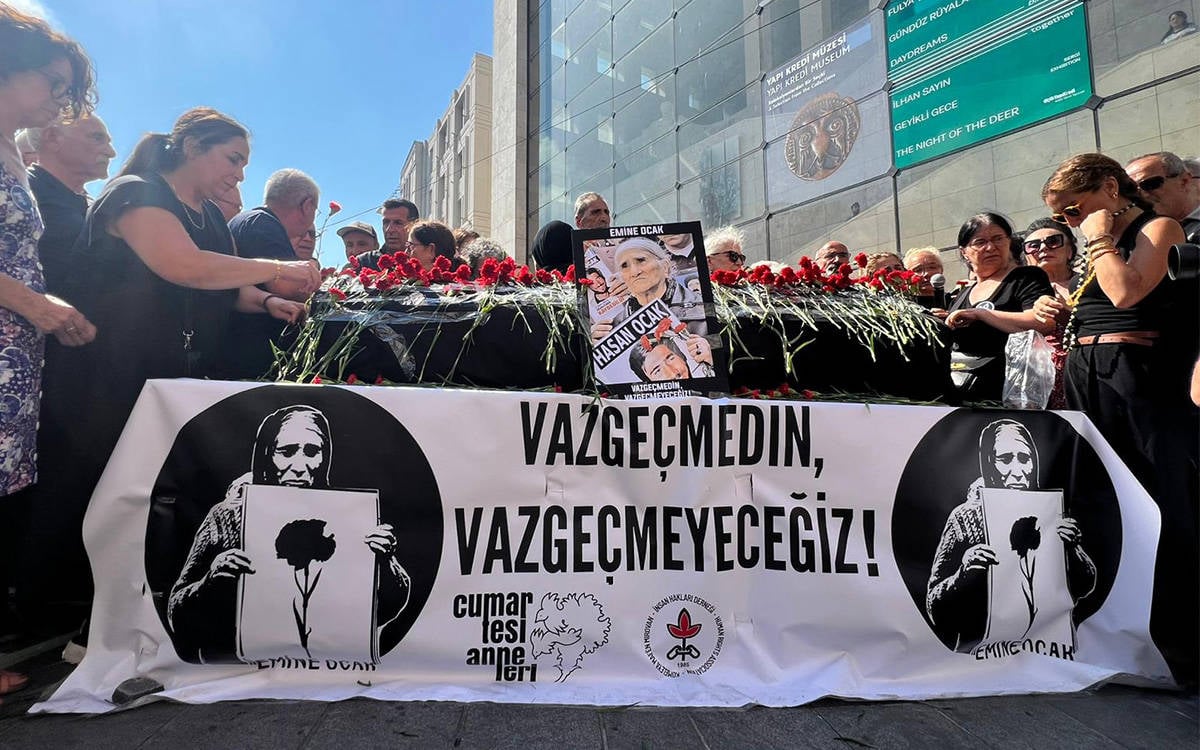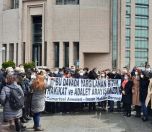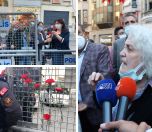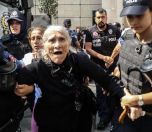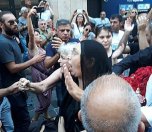* Photo: bianet - File
All children, except one, grow up. They soon know that they will grow up, and the way Wendy knew was this. One day when she was two years old, she was playing in a garden, and she plucked another flower and ran with it to her mother. I suppose she must have looked rather delightful, for Mrs. Darling put her hand to her heart and cried, "Oh, why can't you remain like this forever!" This was all that passed between them on the subject, but henceforth Wendy knew that she must grow up. You always know after you are two. Two is the beginning of the end. (Barrie, Peter Pan, p.3)
***
Also used in English as "no place", "non-existent country", or "non-existent lands", neverland first became a widely known motif in Western thought and literature by Scottish novelist and playwright James Matthew Barrie in 1904 as a play, and in 1911 as a novel. The opus magnum, which is also titled The Child Who Doesn't Grow, is not only popular in children's literature, but it is also one of the canon figures of cinema, television, and the Internet. [1]
However, before James Matthew Barrie, the term Never Never had been used by Australian poet Barcroft Boake (1866-1892) in his poem titled "Where the Dead Men Lie". Never Never is a synonym used for Australian Outback, which is a remote and sparsely populated area and is not related to urban places in the country. The poem summarizes how men are lonely and far from their beloved ones. [2]
In addition, Archibald William Stirling wrote a book titled The Never Never Land: A Ride in North Queensland (1884), in which he claims "Queensland someday, and above all the 'Never Never Land,'—as the colonists call all that portion of it which lies north or west of Cape Capricorn—will be among the greatest of England's dependencies (1884, p. vi.), which implies that Never Never Land is a remote, fruitful, and adventurous place for both colonists and String. Apart from String, Australian writer Jeannie Gunn published an autobiographical book named We of the Never Never (1908), on her experiences in Mataranka, Northern Territory, Australia in addition to Roza Campbell Preid, who is also an Australian novelist, and who wrote a novel titled Lady Bridget in the Never Never Land in 1915.
The common feature of all these works is the authors' use of the concept of Never (Never) Land as remoteness from civilization, which makes the place both exciting and unknown. Also, the Never (Never) Land transforms the characters through the experiences they have had.
A metaphorical analogy with Saturday Mothers
Within the perspective of Peter Pan, another term comes into the discussion: utopia. [3] Neverland is a utopic place in the novel. According to the Turkish Language Association (TDK), utopia is an "impossible plan or idea". In the Cambridge and Oxford dictionaries, it is defined as "the imaginary place where everything is perfect", and in the Merriam-Webster dictionary, it is defined as "a place where law, government and social situations are ideally perfect an imaginary uncertain and distant place".
From this point of view, Neverland where Peter Pan lives is also a utopia even though it contains pirates trying to disrupt the "perfect" order. Peter Pan, the micro-embodiment of the Neverland, also represents utopia itself, emphasizing how wonderful and superior he is throughout the novel.
To put it in a nutshell, the focus of this article is to introduce the Saturday Mothers, who have been the agents of one of the longest civil disobedience movements in the world, the Saturday Mothers struggle, metaphorically by drawing an analogy between Neverland in Peter Pan and the struggle of Saturday Mothers in Turkey.
CLICK - Saturday Mothers/People demand justice for 26 years
Missing children in Neverland and motherhood
In the novel, what Peter Pan and the other children of Neverland have in common is that they never grow up. In Neverland, there is no line between fantasy and reality, and children do not need any rational effort to make whatever they think, or their hearts go through.
It is about three siblings named Wendy, John, and Michael who go after Peter Pan one night to the Neverland. It also tells, on the one hand, these siblings' mother and her mourning of her loss and children's whereabouts; on the other, Wendy's role of motherhood to all the children in the Neverland, their struggles with evil pirates led by Captain Hook, and various adventures.
As for the Saturday Mothers of Turkey, they have been silently asking about the fate of their forced disappeared children with carnations and photographs in Galatasaray Square in İstanbul, Taksim every Saturday at 12 pm since 1995 although they have been blocked and banned from time to time.
CLICK - Police Attack Saturday Mothers with Plastic Bullet
Inspired by the Plazo de Mayo protests in Argentina, the Saturday Mothers are trying to make their voices heard by the authorities and the whole world by asking about the fate of their children who were forcedly disappeared.
These children are alike the missing children in Neverland in Peter Pan. The whereabouts of these children are unknown. How they were lost and what happened to them is unclear. There is no rational mechanism to respond to this. The fact that these people are the same age as the day they disappeared from their mother's eyes and never grew up can be understood from the photographs of their mothers that have not changed over the years. Thus, the Saturday Mothers' children are like inmates in Neverland who never grow up.
At the beginning of the novel, motherhood is a term that is used as an organizer and a protective role for a woman:
Mrs. Darling first heard of Peter when she was tidying up her children's minds. It is the nightly custom of every good mother after her children are asleep to rummage in their minds and put things straight for next morning, repacking into their proper places the many articles that have wandered during the day. If you could keep awake (but of course you can't) you would see your own mother doing this, and you would find it very interesting to watch her. It is quite like tidying up drawers. You would see her on her knees, I expect, lingering humorously over some of your contents, wondering where on earth you had picked this thing up, making discoveries sweet and not so sweet, pressing this to her cheek as if it were as nice as a kitten, and hurriedly stowing that out of sight. When you wake in the morning, the naughtiness and evil passions with which you went to bed have been folded up small and placed at the bottom of your mind and on the top, beautifully aired, are spread out your prettier thoughts, ready for you to put on. (Barrie, p. 9)
As the quotation reveals, a mother organizes her children's minds "naturally" as she tidies their room, which points to the power of the mother on her children's development. In addition, she always protects their children from all the evils and issues that are capable of giving harm.
The night that children went after Peter, Ms. Darling's power to protect her children as a mother would be questioned:
Mrs. Darling quivered and went to the window. It was securely fastened. She looked out, and the night was peppered with stars. They were crowding round the house, as if curious to see what was to take place there, but she did not notice this, nor that one or two of the smaller ones winked at her. Yet a nameless fear clutched at her heart and made her cry, "Oh, how I wish that I wasn't going to a party to-night!" Even Michael, already half asleep, knew that she was perturbed, and he asked, "Can anything harm us, mother, after the night-lights are lit?" "Nothing, precious," she said; "they are the eyes a mother leaves behind her to guard her children." (p. 20)
Yet, when Ms. and Mr. Darling come back, they cannot find the children at home, which symbolically means the mother's eyes are blinded.
That is very similar to one of the Saturday Mothers' experiences.
Mother A [4] tells that she brought her son to the police station for giving a statement and never took him back. That she has been stating for about 20 years, "Oh, how I wish that I wasn't going to the police station that day!" is alike to Ms. Darling's. Both mothers would be life-long regretful for about that day which they lost their children.
Remembrance and protecting children's memories
Apart from this, Peter Pan uses motherhood to convince Wendy to stay with them although he once said that he does not have a mother and has no "desire to have one" (p. 23) and thinks that mothers are "very over-rated persons" (p. 23). After that, he tells Wendy that he is together with the Lost Boys, "who fall out of their perambulators when the nurse is looking the other way" (p. 27), and he is also their captain. Despite his thoughts against motherhood, it comes insight as a defense mechanism for he feels alone when he tells that Wendy "could tuck [them] in at night" as well as "darn [their] clothes, and make pockets for [them]" (p. 29-30). Wendy's attitude towards both Peter and the Lost Boys is the ownage of motherhood role.
While Ms. Darling and Mother A lose their right to protect their children and might never see them again, Wendy accepts and wants to maintain the thing that her mother has lost. In her acceptance, there is the feeling of remembrance and fear of forgetting. As she is observing Peter that he seems not to remember them after he goes far away and turns back, she thinks that to be able to remember is very related to being alive and having an identity.
In this respect, it can be said that the Saturday Mothers have transformed from the position of Ms. Darling, who prefers to stay at home and waits for her children's coming back, into the position of Wendy, who sees herself as responsible for the remembrance and protecting the memories of the children in Neverland.
Resistant, hopeful, decisive
All the history of struggle also resembles Neverland.
On this evening the chief forces of the island were disposed as follows. The lost boys were out looking for Peter, the pirates were out looking for the lost boys, the redskins were out looking for the pirates, and the beasts were out looking for the redskins. They were going round and round the island, but they did not meet because all were going at the same rate. (p. 42)
Similar to Neverland, in Turkey, the Saturday Mothers are asking for their children with the human rights activists asking for "justice", the police are asking for "criminals and custody", the statespeople are asking for "ending the protests", political parties are asking for setting up alternative groups such as Martyr Mothers. They are au pied de la Lettre "going round and round" in since 1995 but could not meet because all are going at their route.
At that point, Captain Cook can be metaphorically seen as the authorities in Turkey in the sense of his attitude towards Wendy. He finds Wendy very dangerous because the Lost Boys could find a mother now, which means Captain Hook cannot manipulate the children on the island anymore. We see how motherhood is defined as a powerful and protective phenomenon by the island residents. In other words, for Captain Hook, a mother means remembrance, identity, and protection, which results in power in humans.
The authorities in Turkey have always tried to block the mothers and their struggle in public not to face the politics of denial of the disappearances and to manipulate the historical facts and politics of the state of Turkey against opponents. Wendy's words to the Lost Boys summarize how a mother's love is effective: "If you had known how much and how deep a mother loves, you would never be afraid" (p. 92, trans. by me).
The way Ms. Darling sleeps every night without closing the window in case her children return is like some of the Saturday Mothers never locking their door and/or never having curtains over the windows in their house. The lost children of mothers are also in an unknown land.
At this point, the land becomes a symbol of hope, possibility, and expectation. That is why Ms. Darling is very unhappy after she loses her children. "Now that we look at her closely and remember the gaiety of her in the old days, all gone now just because she has lost her babes, I find I won't be able to say nasty things about her after all. If she was too fond of her rubbishy children, she couldn't help it" (p.140). This is how the Saturday Mothers look indeed, but resistant, hopeful, and decisive.
[1] Neverland is a fictional island in the novel where Peter Pan, Captain Hook, Tinker Bell, and the Lost Boys live. Peter Pan, the protagonist, refuses to grow up that is why he is always a child. Thus, neverland symbolizes eternal childhood, escapism, and immortality (Wikipedia, 2021). In the early versions of the play/novel, Barrie used the term the Never Never Land as well as "Peter's Never Never Never Land".
[2] To read the poem, please refer to https://www.poetrylibrary.edu.au/poets/boake-barcroft/poems/where-the-dead-men-lie-0089031
[3] Among utopias known worldwide in literature are Republic by Plato, Utopia by Thomas More, The City of the Sun by Thomas Campanella, New Atlantis by Francis Bacon, Erowhon by Samuel Butler, We by Yevgeny Zamyetin, and Island by Aldoux Huxley
(Source: https://www.theguardian.com/books/2004/apr/29/top10s.utopias.dystopias).
[4] Because of ethical issues, the real IDs of the agents are not used in the article. Instead, the letter codes are assigned for each one.
About Eren AlkanEren Alkan earned his M.A. and Ph.D. in American Culture and Literature from Ege University, Turkey. He is still pursuing his second doctorate in Sociology at Rovira i Virgili University, Spain. He works as a lecturer doctor in the Department of Sociology at Ege University. His areas of expertise include comparative history, American theater and violence politics, women's peace movements, eco-criticism, and anti-war literature. |
(EA/SD)






